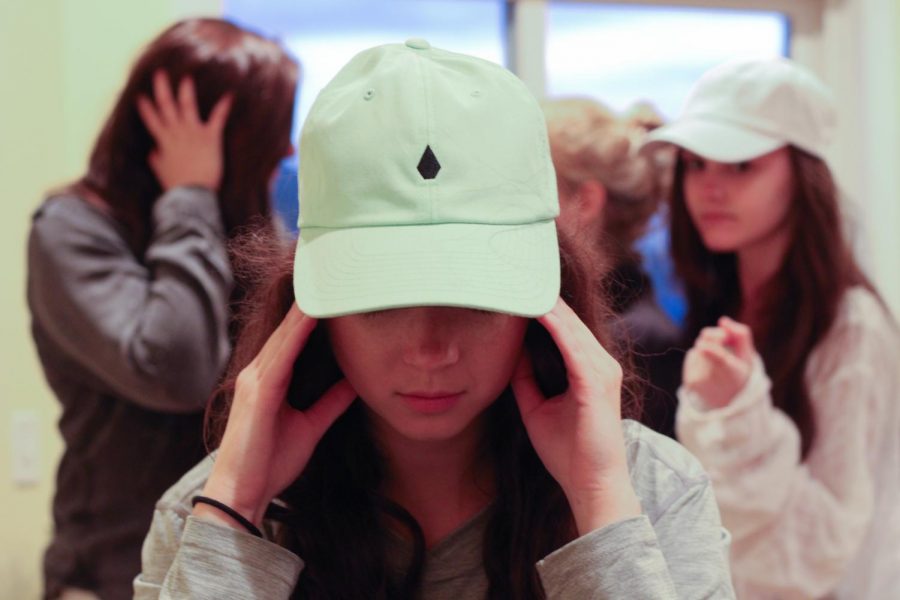Manifesting Misogyny
In a world of hypercritical judgement against women, women are often their worst critics
March 30, 2018
Your life is comprised of the decisions you make, small and large. But do those decisions reveal who you are, or rather who you are taught to be?
You decide whether marriage is something to covet or something to eschew. You decide how to spend your time and money. How to parent. Whether to interrupt or wait politely before you speak. Which selfies to share, and the parts of yourself you never will.
In our society, the most insidious form of sexism isn’t the one we see when we look out at the world, but the one we fail to see when we look inside ourselves. It’s internalized sexism, and that is no one’s fault, but everyone’s problem.
In the last century, many women have made gains toward gender equality, but despite a slow revolution that has given many women increasing power over their lives, sexism is still pervasive. Every woman has felt it, even if she refuses to label it. This is why many women may not realize that since the moment they were born they have been groomed to be sexist, too.
“You could not subordinate half the human race unless some of that was internalized,” Gloria Steinem, American journalist said in an interview about women’s issues.
The media ritually objectifies women’s bodies, yet women obsessively use those images to measure themselves and the women around them against an impossible standard. Instead of progress, we see decline and create an impossible standard for ourselves. In the United States alone, 20 million women will suffer from an eating disorder at some point in her life. Why is this?
Culture sells the idea of a “perfect woman.” Girls are taught to aspire to it, boys learn to expect it. A woman should be sexy, but modest. She must be strong, but sweet. She should speak up, but not too loudly. She should be competent, but not aggressive. Remember to smile, but not so big.
Women feed into this, often without even knowing. We internalize sexism but may not call ourselves sexist or condone overtly sexist behavior. Instead, we will undervalue our talents, undermine other women and unwittingly bolster male dominated concepts that have a long history of policing women’s bodies.
Sex Sells
A rigid standard of female beauty is one of the most powerful forms of cultural currency, despite us having no control over our genetic makeup. The fashion and beauty industries — women dominated fields — are ever becoming more diverse, but still we see a young, white, thin ideal persists.
During the Spring 2017 season, plus-size models accounted for 16 of the 2,973 model spots, only 13 models were over age 50, and seven out of the 10 models with the most bookings for the season were white.
So women strive for the ideal. They buy makeup and anti-aging serums. They suffer Spanx, slip into shoes that pinch and skirts that constrict. They see natural body hair as an enemy of the state.
But what is it that really keeps us from viewing wrinkles as badges of honor and stretch marks as the map of a body’s extraordinary transformation? Why do we work so hard to fight our bodies and moreover, other women?
For some, the answer is that attending to their bodies is akin to personal care. It makes women feel good. Bailey Snell, criminal justice senior, said she often used to feel other women didn’t take her seriously because of her love of fashion and make-up.
“As someone who does enjoy makeup and wears it on a daily basis, I do feel like some females view that as me being less confident in myself compared to them because they don’t need to wear makeup,” Snell said.
Snell also said she would never tell another girl that she should probably put some makeup on for any reason so she still feels unclear on why it is acceptable for the reverse.
The problem is when women perform these rituals as a matter of course, even when it doesn’t make them feel true to themselves.
‘But What Were You Wearing?’
The sexual objectification of the female body has dangerous consequences because it contributes to a culture of sexual violence. Young or old, privileged or poor, gay or straight. No groups of women are invulnerable.
Yet one of the greatest myths of internalized sexism is that if you are the perfect woman if you dress modestly, drink moderately, socialize in the right settings, reject promiscuity, then you will be safe. It’s why you hear women asking, “did you drink too much?” or “did you do anything that could’ve been misinterpreted?”
This contributes to a culture of victim-blaming, which discourages women from reporting abuse, and allows male predators to go unpunished. About two out of three sexual assaults are never reported to police, according to the Rape, Abuse & Incest National Network.
Women internalize sexism because it’s comforting to think if you follow society’s rules, you won’t get hurt.
“A friend of mine shared on Facebook a slut shaming picture and rant about how women who wear revealing clothes aren’t wife material or good girls, but just for fun and done or are ‘asking for it,’” Jessica Laux, New Albany resident, said. “It’s scary that women can feel that way [about other women.]”
Confronting The Issue
Confronting internalized sexism is an uncomfortable unraveling. It requires disentangling what we actually want from what we learn explicitly and implicitly.
Becoming the “perfect woman” isn’t possible. She doesn’t exist. The more we try to mold ourselves to her, the less time we have to figure out who we truly are. Every individual woman has their own desires, their own experiences, their own life and so there’s no way to prescribe a certain way of behaving for every single woman.
We as women and allies need to hold each other accountable and shy away from these formats we have been programmed to follow as women. We need to back away from our misogynistic tendencies and instead, lift other women up.













